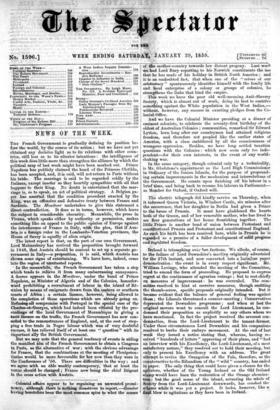Colonial affairs appear to be regaining an unwonted promi- nency,
although there is nothing disastrous to report,—disaster having heretofore been the most common epic* to whet the senses of the mother-country towards her distant progeny. Last week we had Lord Bury reporting to his Norwich constituents the use that he has made of his holiday in British North America ; and it is an undoubted fact, that when one of the "scions of our aristocracy" spontaneously identifies himself with the family life and local enterprise of a colony or group° of colonies, he strengthens the links that bind the empire.
This week we have the poor old well-meaning Anti-Slavery Society, Which is almost out of work, doing its best to contrive something against the White population in the West Indies,— without, however, any success in exacting pledges from the Co- lonial Office.
And we have the Colonial Minister presiding at a dinner of eminent colonists, to celebrate the seventy-first birthday of the oldest of Australian Colonies ; communities, remarked Sir Edward Lytton, born long after our countrymen had attained religious freedom, and therefore not peopled like the earlier states of America, with a class embittered by all the consciousness of wrongous oppression. Besides, we have long settled taxation questions with the Colonies : which now seem only too inde- pendent—for their own interests, in the event of any world- shaking war.
In the same category, though colonial only by a technicality, is Mr. Gladstone's appointment as the Lord High Commissioner in Ordinary of the Ionian Islands, for the purpose of propound- ing certain improvements in the mechanism and interrelations of the Government. He counts upon finishing off his labour in a brief time, and being back to resume his labours in Parliament— as Member for Oxford, if Oxford will.


























